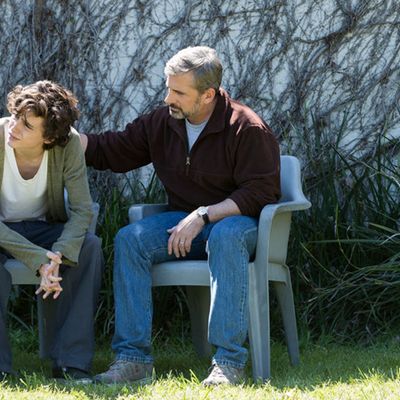
The best news about the addiction-and-recovery (and-relapse-and-recovery-and relapse-and-recovery) drama Beautiful Boy is that Timothée Chalamet’s breakout performance in Call Me By Your Name wasn’t a fluke.
Apparently, he’s all that. As the 18-year-old crystal meth addict Nic Sheff, Chalamet has perpetually unkempt locks and a skinniness that alters his center of gravity, leaving him easily jolted by forces within and without. Chalamet was also hyper-reactive in Call Me By Your Name, but with different, more languid rhythms, as if he’d been softened by the Italian sun: You could read his longing in his flesh and muscles. Here, fully clothed, he’s jumpy, furtive, now defiant, now twisted with shame. At times, he’s as raw as a little boy, at others a hardened liar. Mostly, his Nic is unformed.
The teen has grown up in affluent Marin County, but the director, the Belgian-born Felix Van Groeningen, goes out of his way to show us albums on Nic’s shelf by the “sludge metal” band the Melvins and books by Charles Bukowski that present addiction as an existential statement of hipness. The son of a controlling magazine writer, Nic is one of those kids who break free and end up in a different and more dangerous prison.
With Luke Davies, Van Groeningen adapted not one but two memoirs, the first by Nic’s father, David (Beautiful Boy), the second by Nic (Tweak), but it’s the father’s experiences that, alas, occupy the foreground. That means long stretches of Steve Carell bulging his eyes and looking strenuously pained. An amusing caricaturist in Foxcatcher and The Big Short, Carell is tight and superficial in most serious parts, purging himself of all humor. He’s not quick-witted. His stiffness might have worked for Beautiful Boy — it could be the key to David’s inability to get on his son’s wavelength. But in that case, it would have to seem like Carell’s choice instead of his limitation.
There’s a deadly earnestness to the structure. Beautiful Boy opens with David’s visit to an unseen authority on drug addiction who turns out (in later scenes) to be played by Timothy Hutton — a nice reveal given Hutton’s triumph as the maladapted teenager in Ordinary People, but amounts to little more than an in-joke. The journalist in David wants to learn all he can about crystal meth, and so we hear about dopamine depletion and other not-so-fun facts that don’t end up contributing much to his scenes with Nic.
Countering despair with science could have made for some amusingly awkward moments. I should know, having repeatedly told my very-sad daughter, “Smile — it releases endorphins,” which not only made her increasingly angry but turned out not even to be true.
As in his other films, Van Groeningen creates a tapestry of flashbacks, here of father and son at different, more intimate stages of their lives. This makes for a lively, varied palette but not an especially illuminating one. (Whose big idea was it to use “Sunrise, Sunset,” I wonder? It’s not just on the nose — it breaks the nose.) The movie might be an instance of the subjects being too close to the moviemakers. The director doesn’t seem to want to take any shots — even gentle ones — at David or the family’s startling upscale lifestyle. The Sheffs, David and his second wife, an artist played by Maura Tierney, have a woodsy dream house, which raises the question: Was there inherited money or does magazine writing pay that well? It’s a welcome break when Amy Ryan enters the film as Nic’s mother, who lives in Los Angeles. Ryan is alive onscreen, with several different emotions — guilt, grief, irritation, and more guilt — passing over her face in an instant.
And then there’s Chalamet… Despite the unevenness and splintered syntax, Beautiful Boy finally takes hold. Nic’s first relapse is nightmarish, his second… also nightmarish. To complain of repetition is to miss the point. It’s the repetition that wears people down — addicts and parents and friends alike. In one scene, David begs Nic to come home, and Chalamet’s Nic quivers with indignation that his dad could think he’s using again when he just wants to be independent… and also get some money for… something. In a later scene, it’s Nic who begs to come back while his father and stepmother force themselves, on the advice of councilors, to close the door. A test of an actor is playing someone who’s split in so many ways that he moves forward while looking backwards and vice versa, and Chalamet is already a master. How’s his iambic pentameter? I smell something rotten in Denmark if he has the technical skills.
Beautiful Boy has an ending that is at once open and conclusive. Will Nic’s recovery take? The conclusive thing is the twin memoirs and the movie. Nic and David came onstage after the movie’s Toronto International Film Festival premiere, which in this day and age is a kind of closure. Now Nic doesn’t just owe it to his parents and himself to stay clean. He owes it to us — and Timothée Chalamet.


